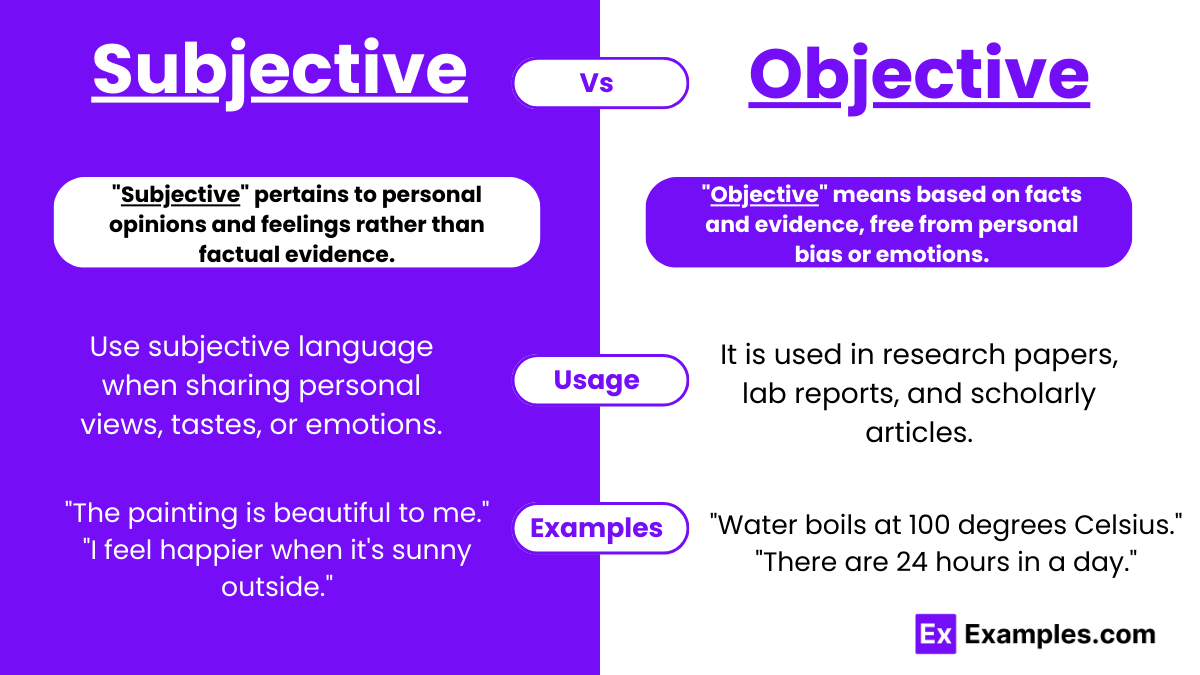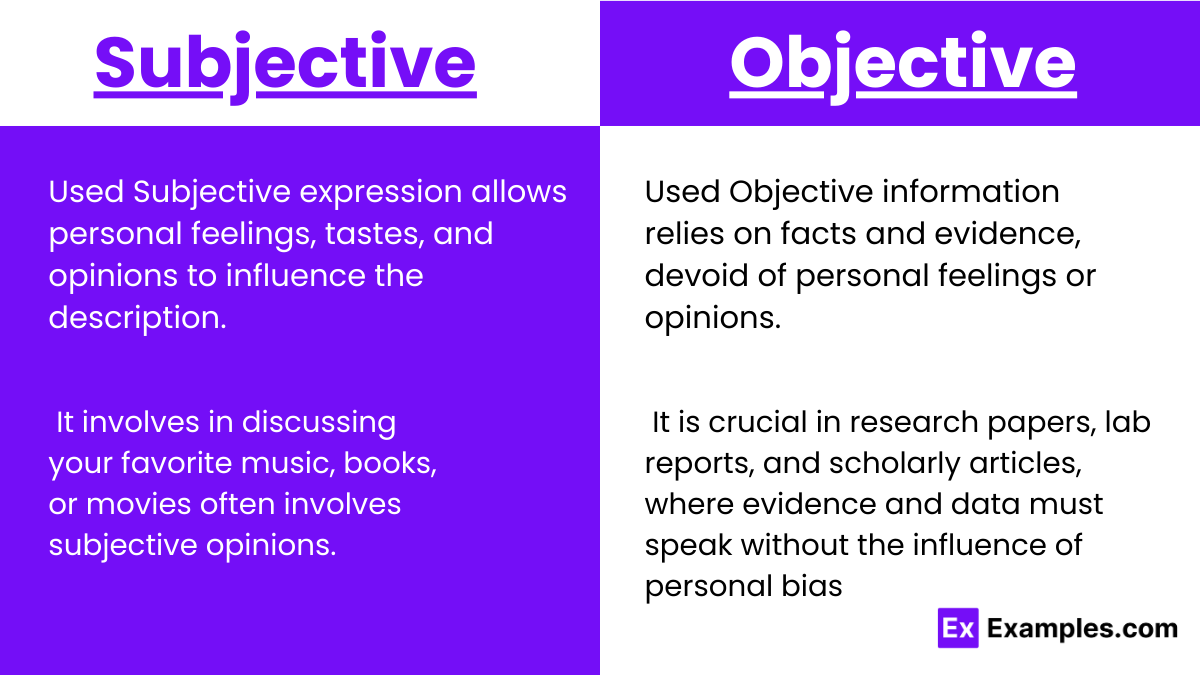Subjective vs Objective
Navigating the realms of perception and fact, subjective and objective perspectives offer us a lens through which we view the world around us. Subjectivity, coloured by individual emotions, beliefs, and experiences, allows for a diverse tapestry of opinions and perceptions, exemplified by statements about beauty or taste that vary widely among individuals. On the other hand, objectivity stands as the bedrock of verifiable truth, grounded in facts and evidence, immune to personal biases, as seen in scientific truths about the natural world. This dichotomy not only enriches our understanding but also challenges us to discern the nature of the information we encounter daily.
As we delve into the intricacies of subjective and objective viewpoints, it becomes clear that these concepts permeate various aspects of our lives, from art and personal preferences to the immutable laws of science and grammar. The distinction between these perspectives is crucial, not just in academic discourse but in everyday interactions, shaping our arguments, beliefs, and understanding of truth. This exploration serves as a foundation for critical thinking, empowering students to articulate their thoughts with clarity and discern the reliability of information, a skill that is increasingly vital in our complex, information-saturated world.
What Does “Subjective” Mean?
“Subjective” refers to judgments, perceptions, or interpretations that stem from personal views, emotions, and experiences, rather than external facts or evidence. It embodies the idea that how one perceives and responds to their environment is deeply personal and can vary significantly from one individual to another. Subjectivity is anchored in the internal realm of thoughts, feelings, and biases, highlighting the unique lens through which each person views the world around them.
In essence, subjective assessments are influenced by individual backgrounds, preferences, and subjective states, making them inherently personal and often resistant to universal agreement. This concept underscores the diversity of human experience and the personal nature of much of our understanding and interaction with the world, acknowledging that what holds true or appears evident to one person may not be so for another due to the subjective nature of perception.
What Does “Objective” Mean?
The term “objective” refers to a stance or perspective that is rooted in facts, evidence, and observable phenomena, devoid of personal biases, emotions, or subjective interpretations. It emphasizes impartiality and a quest for truth that can be universally verified and accepted, regardless of individual perspectives. An objective approach relies on concrete, measurable data and facts that remain constant, irrespective of personal feelings or varying viewpoints.
In essence, objective information or analysis is characterized by its ability to be substantiated through empirical evidence and logical reasoning. It stands as the cornerstone of scientific inquiry, academic research, and any discourse where the validity and accuracy of information are paramount. This concept underpins the pursuit of knowledge that transcends personal biases, ensuring that conclusions drawn are not influenced by individual sentiments but are instead reflective of the reality that can be observed and agreed upon by all.
Summary
The contrast between “subjective” and “objective” lies in the nature of the information being presented. Subjective information is shaped by individual perceptions, emotions, and experiences, making it inherently personal and variable. Objective information, on the other hand, is based on concrete facts and empirical evidence, unaffected by personal feelings or prejudices.
For example, declaring a cake delicious is a subjective opinion, reflecting personal taste. In contrast, stating that the cake has 250 calories per serving is an objective fact, verifiable and independent of individual perspective.
Difference Between Subjective and Objective
| Subjective | Objective |
|---|---|
| Based on personal feelings, opinions, or beliefs. | Based on factual evidence and data. |
| Can vary from person to person. | Consistent and universal, regardless of individual perspective. |
| Influenced by personal experiences and cultural background. | Uninfluenced by personal feelings or biases. |
| Often associated with artistic and literary interpretations. | Associated with scientific and empirical research. |
| Qualitative in nature, difficult to measure. | Quantitative, measurable, and verifiable. |
| Can lead to differing interpretations of the same event or object. | Seeks a singular, factual understanding of events or objects. |
| Subject to change based on individual growth and perspective shifts. | Remains constant as it is anchored in verifiable facts. |
| Plays a significant role in personal decision-making and preferences. | Essential for objective decision-making and scholarly discourse. |
| Emphasizes the importance of personal context and narrative. | Emphasizes impartiality and detachment from personal context. |
| Can be expressed through qualitative methods like descriptive writing. | Expressed through quantitative methods like statistical analysis. |
How To Remember the Difference Between Subjective and Objective?
To remember the difference between “subjective” and “objective,” consider using the following mnemonic and visual cues:
- Subjective = Subject’s View: Think of “subjective” as related to the “subject” (the person). It’s all about the subject’s personal view, feelings, or experiences. Imagine a person (subject) wearing glasses tinted with their own colors, representing their unique perspective on the world.
- Objective = Object’s Fact: For “objective,” associate it with an “object” that represents facts, figures, and unbiased information. Picture an object like a clear crystal or a lens that shows things as they are, without any distortion or coloration from personal feelings.
- “S” in Subjective for “Self”: The “S” in subjective can help you remember that it’s about one’s self or personal viewpoint.
- “O” in Objective for “Outside”: The “O” in objective can remind you that it relates to outside, observable facts that are independent of personal feelings or biases.
- Emotion vs. Evidence: Subjective is to emotion as objective is to evidence. When you think of subjective, think of emotional reactions; when you think of objective, think of empirical evidence.
By associating subjective with personal views and objective with factual evidence, and using these visual and mnemonic cues, you can more easily recall the difference between the two.
Examples of Subjective and Objective
Understanding the distinction between subjective and objective statements is crucial for clear communication and analytical thinking. Subjective statements are influenced by personal feelings, opinions, or preferences, reflecting an individual’s perspective. In contrast, objective statements are based on factual, verifiable information, independent of personal bias. Here are examples of each to illustrate the difference:
Subjective Examples:
- I think chocolate ice cream is the best flavour.
- She believes that winter is the most beautiful season.
- In my opinion, The Godfather is the greatest movie of all time.
- I feel that morning runs are more refreshing than evening ones.
- He claims that classical music is more sophisticated than other genres.
Objective Examples:
- The Eiffel Tower is located in Paris, France.
- Water boils at 100 degrees Celsius at sea level.
- The Amazon Rainforest is the largest tropical rainforest in the world.
- The earth revolves around the sun in approximately 365 days.
- Bees are known for their role in pollination and for producing honey
When to Use Subjective and Objective
Understanding when to use subjective and objective perspectives is essential for effective communication and analysis. Here’s a guide to help you determine the appropriate context for each:
Usage of Subjective:
- Expressing Personal Opinions and Feelings: Use subjective language when sharing personal views, tastes, or emotions. For example, discussing your favorite music, books, or movies often involves subjective opinions.
- Art and Literature Critiques: Artistic and literary interpretations are inherently subjective, as they involve personal reactions and analyses of themes, styles, and messages.
- Persuasive Writing and Speeches: When trying to persuade others, incorporating subjective viewpoints can make arguments more relatable and compelling by connecting on an emotional level.
- Reflective Writing: Journals, diaries, and personal blogs are ideal for subjective expression, allowing for the exploration of personal experiences, thoughts, and feelings.
- Cultural and Ethical Discussions: Conversations about ethics, morality, and culture often involve subjective reasoning, as they are deeply influenced by personal beliefs and societal norms.
Usage of Objective:
- Academic Research and Reporting: Objective language is crucial in research papers, lab reports, and scholarly articles, where evidence and data must speak without the influence of personal bias.
- News Reporting and Journalism: Ethical journalism requires objectivity to present facts and information without distortion by personal feelings or prejudices.
- Technical Writing and Manuals: Instructions, manuals, and guides should be objective to provide clear, unambiguous information without any room for interpretation.
- Scientific Analysis and Discussion: Scientific discussions demand objectivity to ensure conclusions are based on empirical evidence and reproducible results.
- Legal Documents and Proceedings: Legal language is objective to ensure that laws, contracts, and legal findings are interpreted based on facts and statutes, not personal opinions.
Balancing subjective and objective perspectives is key in various contexts, and recognizing when to employ each can enhance clarity, credibility, and effectiveness in communication.
FAQs
Is Beauty Subjective or Objective?
Beauty is predominantly subjective, as it relies on personal preferences, cultural influences, and individual perceptions. What one person finds beautiful, another may not, emphasizing the role of personal taste in the appreciation of beauty.
Why is Beauty Not Subjective?
Beauty can be considered not purely subjective because certain aesthetic principles and biological factors can influence a wide agreement on what is considered beautiful, suggesting some level of objectivity.
Is Being Cute Subjective?
Being cute is subjective, as it is based on individual opinions and varies greatly from person to person. What one finds cute, another might not, due to differences in personal tastes and cultural standards.
Why is Beauty Not Objective?
Beauty is not entirely objective because it cannot be measured or evaluated by a standard set of criteria that universally applies to everyone’s perceptions and emotional responses





